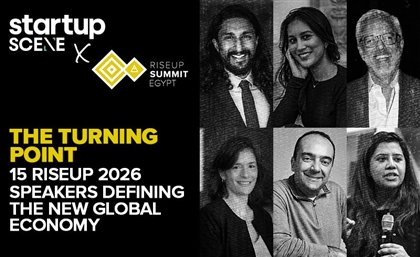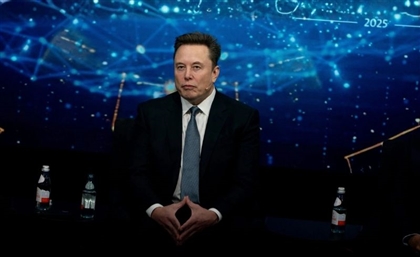IBM’s CDO: We Have To Make Sure Innovation Is Tied To Something Concrete
RiseUp’s Co-Founder and CEO Abdel Hameed Sharara sits down with IBM’s Chief Digital Officer Bob Lord to talk about grounded experiences in the tech giant’s vision embodied in supporting entrepreneurship.

Cairo’s iconic Greek Campus has welcomed on Monday November 6tha convoy from IBM, lead by Robert “Bob” Lord. After having coffee from the campus’ brand new kiosk Coffeeholics, Abdel Hameed Sharara, RiseUp’s co-founder and CEO received the group and showed them around the offices of the startup residents, such as Nafham, PayMob, and MO4 Network.
Bob Lord is IBM's first Chief Digital Officer where he is now missioned with bringing together the IBM Digital Business Group. He is responsible for overseeing the Digital Platforms team, Digital Sales organization, Digital Marketing, Routes to Market and Offering teams, and IBM's Developer and Startup Ecosystem.
After celebrating IBM’s Call For Code finalists with tickets to IBM's Think Summit in San Francisco, Sharara and Lord concluded the convoy’s visit by a fireside chat at 4:30 PM attended by startups and tech enthusiasts.

IBM and RiseUp have just announced the signing of a Memorandum of Understanding to partner in the summit.
“If you’re an entrepreneur and you don’t have a development team on board, you won’t be an inductive business leader,” Lord says. “I think that’s why the demand for these skills has risen,” he explains. Lord went on talking about the global technical generational gap and how the ecosystem is packed with opportunity due to that. “In the young generation, people are coding already. It used to take me months to learn HTML, nowadays a kid coming out of high school or even elementary school knows how to write a webpage, knows what HTML is.”
So, the technical competency of the general population is rising. It’s just a matter of that generation catching up to the demand that’s here. IBM is now committed to train and continue to mentor the development community.
“What I am excited about is the progress we’re making around Machine Learning, and AI systems. And when I talk about AI systems, I mean augmented intelligence, I don’t mean Artifical Intelligence. Artificial intelligence to me, and a lot of bot programmes you see, with Alexa and Google Home, those things just talk back and forth to you. They don’t augment your decision-making. So, when you talk about machine learning and how you apply machine learning onto that data set, it’s all about whether or not you’re finding that insight into that data that no one else can find, that’s your competitive advantage."
IBM's CDO is also very excited that the AI and machine learning tools are getting so sophisticated in figuring out rush analysis and also figuring out how people use data sets to ensure they're not finessing the machine learning models. Thus, every profession existing today will fundamentally change because augmented intelligence will rule out even legislatives.

"RiseUp Summit is a neutral platform on which we connect startups in the ecosystem with the relevant resources to help them scale up."
"This whole job will change, because augmented intelligence will rule out all the mundane work that he has to do to look through legal precedents and research," he says. "AI will be able to read those documents, provide him with insights so he can actually help us in a better way and actually use his skill sets so he can help us with more legal strategy. Legal strategy vs actually just reading through lots of manuals. So every profession in the world will change, so I’m so excited about the future of where we think about augmented intelligence. On top of that, there are other technologies like blockchain that will allow us to have trusted transactions with people in ways we’ve never imagined. It rules out fraudulence, create trust amongst society, create trust among people, create trust among businesses and I think blockchain is just on the cusp of really revolutionising how we do transactions as a society."
“But I will tell you one thing that will not change as a business model: you as the business owner need to own the data asset. And the reason why I say this, is because business after business, if you don’t own or create a data asset for yourself just like MO4 Network; the reason why they have media properties, is not because they want distribution of content, it’s because they’re collecting data on usage. That’s an asset that has a value to it. So, at the core, you have to say, I’ll not create X Y Z platform because it’s a trend. You have to say what is my core operating principle as a business in collecting data and having a data asset around your users is probably your biggest competitive advantage whether you’re a large bank or whether you’re a startup. So that’s my first lesson. I created a platform with AOL on a formatted site and being a platform is not what sold the company; what sold the company was the data that that platform created. “

"This whole job will change, because augmented intelligence will rule out all the mundane work"
So why is IBM here?
IBM is an open community and there the support to the developers and data scientist has scaled. “My interest is very clear. my interest is that our big entreprise clients are going to be influenced by the work that Egyptian entrepreneurs do. So, if you’re a fintech startup here in the community and you end up getting bought by Vent; which would be a really nice exit wouldn’t it?” he jokes. “I want you to be on the IBM cloud, and by the way I would want you to be using IBM Watson.So, I want you to realise that the power of IBM seated in an entrepreneurial environment, receded in your mind as a developer.”
What excites Lord about the Egyptian ecosystem is the energy and excitement on both public and private spectrums. "We met with some government officials yesterday and then we met with some businesses," he says. "If you can get in a community like this, you have a better success rate with your startup than if you’re not part of a community like this. Because I fundamentally believe in my career, that it wasn’t about any startup idea that I had or the business that I took over. It was about the network I created throughout that ecosystem."
The CDO praised the Greek Campus for being able to attract startups like Uber, Udacity, and PayMob. "I mean these are fundamentally great businesses, not that you’ll compete against them, but to learn how they approached when they thought about this business idea; who their customer was; why they went that direction; why start up Uber Eats when you’ve been delivering food in Cairo for generations on the phone; what does Uber eats do and how does it actually compete? Having those conversations in the community will help you build your business bigger and better than anything you thought of," he concludes; adding that by just creating a learning environment, to continually be part of a learning environment, entrepreneurs are more likely to be successful than squirreling away in someone’s garage which is often a theory of how an entrepreneur ideally starts up.
Photography courtesy of #MO4Productions
Photographer: Ashraf Hamdy






















